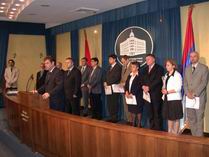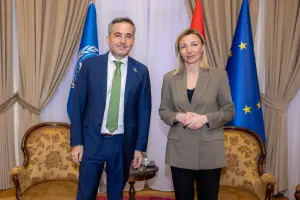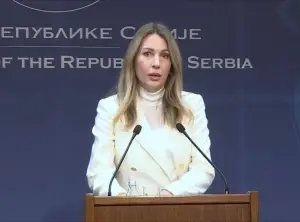Q:
A:
Legal order and institutional peace established
Belgrade,
9 June 2004
In the first hundred days of its work, the Serbian government struggled to establish true legal and institutional order governed by firm rules, and civil and social peace, in which authorities can violate freedom only when laws are not obeyed. The Serbian government acted as a government of all citizens and its work is characterised by ideological neutrality. That is why it is new and special for Serbia, said Serbian Prime Minister Vojislav Kostunica.
Speaking at a conference for media representatives, organised on the occasion of the first 100 days of the Serbian government, Kostunica said that the previous government strengthened its rule by weakening institutions, which created the problem of the parliament's legitimacy, and of the relation between the legislative, executive and judiciary branches. In many cases, the government put itself above the parliament and courts.
He said that this government has put institutions and the law above any state power that is transitory. In order for institutions to exist, it is very important that they are equally respected by those who represent a majority at the moment and those who are a minority.
In the previous period, the government proposed 31 bills on amendments to existing laws, ten of which in the field of judiciary and fight against corruption, and 19 in the field of economy and finance. He reiterated that some of the laws were proposed by the parties which make up the government even before it was constituted.
Kostunica explained that the adoption of amendments to the laws on the election of the president of the republic, and the election of deputies in the parliament allowed for the national minorities an Diaspora to get their representatives in the parliament, and the president of the republic to be elected.
The government has began to bring order into the neglected and chaotic state administration. First, it passed a decree abolishing almost all so-called services established by the previous government. At the same time, it prepared a bill on ministries which legalise some of these services by turning them into special organisations, whose existence will be decided by the parliament. The remaining services are abolished by the bill, said Kostunica, stressing that overall reforms can be discussed only after bring order into state administration and reforming it.
The government also prepared a Plan on political solution to the situation in Kosovo-Metohija, which was unanimously adopted by the parliament. The Plan has been discussed by the international community, the Contact Group, the NATO, the US, the EU, as well as by many forums and non-governmental organisations, with the aim of finding a single political solution for Kosovo-Metohija, the Prime Minister said.
Kostunica said that the government forwarded a draft Serbian constitution to the parliament. He said that reforms in Serbia should not be discussed before the new constitution has been adopted, because democratic changes in a country cannot be carried out in a non-democratic framework, which is provided by the existing constitution.
After the first 100 days of the new government, there has been a change in the negative economic trends and the economic recovery of Serbia has begun, said Minister of Finance Mladjan Dinkic presenting the results in the field of economy and finance.
Dinkic said that the industrial production will grow at least six percent against last year, and that a very large increase in agriculture production is expected. In other sectors, a stable growth of at least four to five percent is expected, so that the GDP should rise six percent by the end of the year, which is the largest growth rate in last ten years.
The Minister said that full macroeconomic stability has been achieved, and that the inflation rate will stand at the projected 8.5 percent at the annual level. The Serbian budget was prepared and adopted in only two weeks, and in relation to last year's, it is directed at public investment. The agricultural budget was increased three times, investments in road infrastructure were doubled, funds for various cultural programmes were increased three times, and the scientific projects also gained priority.
According to Dinkic, the budgetary deficit in 2004 will be only 2.5 percent of the GDP, which is 1.4 percent less than last year, which will be achieved by better collection of taxes and certain economy measures. The government's strategy is to attract more investment by lower taxes, so ten taxes were abolished in the first 100 days. During that time, as much as 19 laws in the field of economy and finance were adopted.
The Serbian government is planning to examine the laws on value added tax, and income tax during this week, which should fully complete the domestic tax system.
He said that some $750 million in direct foreign investment is expected by the end of the year, a half of which will be new investment. He added that cooperation with other financial institutions has been stepped up, so this year will be a turning point for the Serbia's economic development.
The Minister said that the salaries grew by 10 percent, and that the salaries in the health sector, education, institutions of culture, social care, judiciary and children social care centres will be increased.
PHOTO GALLERY: First 100 days of the new Serbian government
He said that this government has put institutions and the law above any state power that is transitory. In order for institutions to exist, it is very important that they are equally respected by those who represent a majority at the moment and those who are a minority.
In the previous period, the government proposed 31 bills on amendments to existing laws, ten of which in the field of judiciary and fight against corruption, and 19 in the field of economy and finance. He reiterated that some of the laws were proposed by the parties which make up the government even before it was constituted.
Kostunica explained that the adoption of amendments to the laws on the election of the president of the republic, and the election of deputies in the parliament allowed for the national minorities an Diaspora to get their representatives in the parliament, and the president of the republic to be elected.
The government has began to bring order into the neglected and chaotic state administration. First, it passed a decree abolishing almost all so-called services established by the previous government. At the same time, it prepared a bill on ministries which legalise some of these services by turning them into special organisations, whose existence will be decided by the parliament. The remaining services are abolished by the bill, said Kostunica, stressing that overall reforms can be discussed only after bring order into state administration and reforming it.
The government also prepared a Plan on political solution to the situation in Kosovo-Metohija, which was unanimously adopted by the parliament. The Plan has been discussed by the international community, the Contact Group, the NATO, the US, the EU, as well as by many forums and non-governmental organisations, with the aim of finding a single political solution for Kosovo-Metohija, the Prime Minister said.
Kostunica said that the government forwarded a draft Serbian constitution to the parliament. He said that reforms in Serbia should not be discussed before the new constitution has been adopted, because democratic changes in a country cannot be carried out in a non-democratic framework, which is provided by the existing constitution.
After the first 100 days of the new government, there has been a change in the negative economic trends and the economic recovery of Serbia has begun, said Minister of Finance Mladjan Dinkic presenting the results in the field of economy and finance.
Dinkic said that the industrial production will grow at least six percent against last year, and that a very large increase in agriculture production is expected. In other sectors, a stable growth of at least four to five percent is expected, so that the GDP should rise six percent by the end of the year, which is the largest growth rate in last ten years.
The Minister said that full macroeconomic stability has been achieved, and that the inflation rate will stand at the projected 8.5 percent at the annual level. The Serbian budget was prepared and adopted in only two weeks, and in relation to last year's, it is directed at public investment. The agricultural budget was increased three times, investments in road infrastructure were doubled, funds for various cultural programmes were increased three times, and the scientific projects also gained priority.
According to Dinkic, the budgetary deficit in 2004 will be only 2.5 percent of the GDP, which is 1.4 percent less than last year, which will be achieved by better collection of taxes and certain economy measures. The government's strategy is to attract more investment by lower taxes, so ten taxes were abolished in the first 100 days. During that time, as much as 19 laws in the field of economy and finance were adopted.
The Serbian government is planning to examine the laws on value added tax, and income tax during this week, which should fully complete the domestic tax system.
He said that some $750 million in direct foreign investment is expected by the end of the year, a half of which will be new investment. He added that cooperation with other financial institutions has been stepped up, so this year will be a turning point for the Serbia's economic development.
The Minister said that the salaries grew by 10 percent, and that the salaries in the health sector, education, institutions of culture, social care, judiciary and children social care centres will be increased.
PHOTO GALLERY: First 100 days of the new Serbian government












